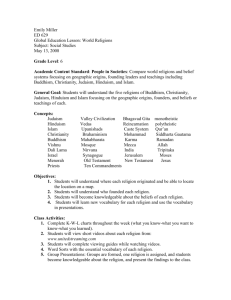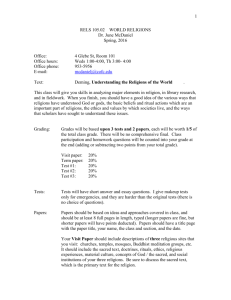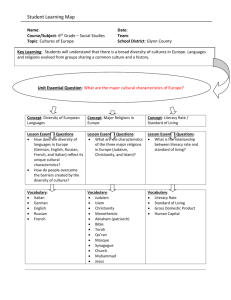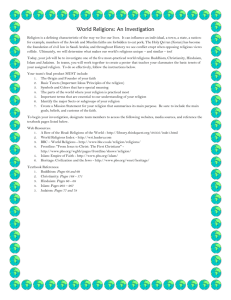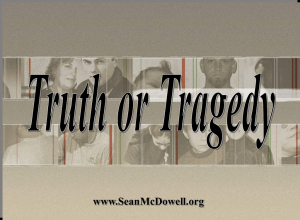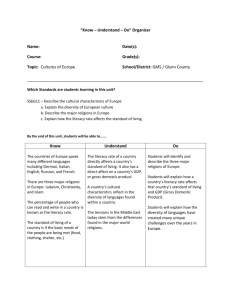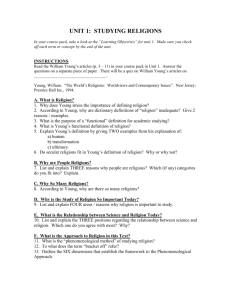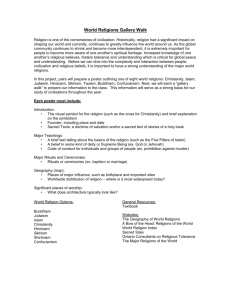Department of Religious Studies Florida International University
advertisement
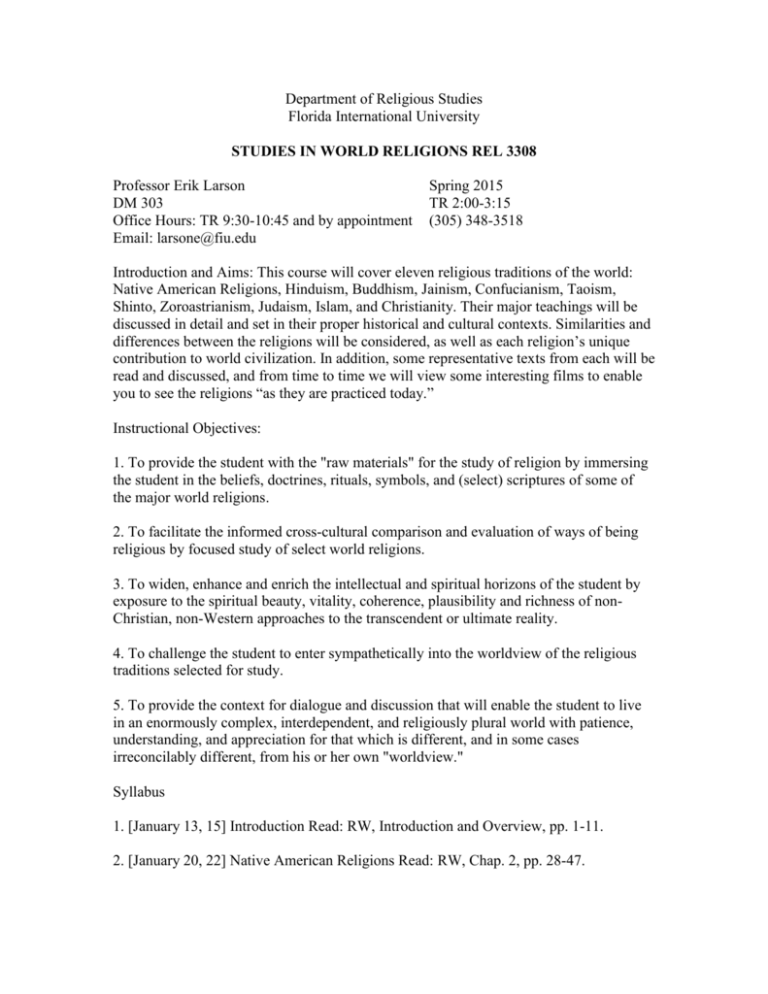
Department of Religious Studies Florida International University STUDIES IN WORLD RELIGIONS REL 3308 Professor Erik Larson DM 303 Office Hours: TR 9:30-10:45 and by appointment Email: larsone@fiu.edu Spring 2015 TR 2:00-3:15 (305) 348-3518 Introduction and Aims: This course will cover eleven religious traditions of the world: Native American Religions, Hinduism, Buddhism, Jainism, Confucianism, Taoism, Shinto, Zoroastrianism, Judaism, Islam, and Christianity. Their major teachings will be discussed in detail and set in their proper historical and cultural contexts. Similarities and differences between the religions will be considered, as well as each religion’s unique contribution to world civilization. In addition, some representative texts from each will be read and discussed, and from time to time we will view some interesting films to enable you to see the religions “as they are practiced today.” Instructional Objectives: 1. To provide the student with the "raw materials" for the study of religion by immersing the student in the beliefs, doctrines, rituals, symbols, and (select) scriptures of some of the major world religions. 2. To facilitate the informed cross-cultural comparison and evaluation of ways of being religious by focused study of select world religions. 3. To widen, enhance and enrich the intellectual and spiritual horizons of the student by exposure to the spiritual beauty, vitality, coherence, plausibility and richness of nonChristian, non-Western approaches to the transcendent or ultimate reality. 4. To challenge the student to enter sympathetically into the worldview of the religious traditions selected for study. 5. To provide the context for dialogue and discussion that will enable the student to live in an enormously complex, interdependent, and religiously plural world with patience, understanding, and appreciation for that which is different, and in some cases irreconcilably different, from his or her own "worldview." Syllabus 1. [January 13, 15] Introduction Read: RW, Introduction and Overview, pp. 1-11. 2. [January 20, 22] Native American Religions Read: RW, Chap. 2, pp. 28-47. 3. [January 27, 29] Hinduism. Read: RW, Chap. 4, pp. 72-115. 4. [February 3, 5] Hinduism, Jainism, Buddhism. Read: RW, Chaps. 5-6, pp. 116-138. 5. [February 10, 12] Buddhism. Read: RW, Chap. 6, pp. 138-155. 6. [February 17, 19] Taoism, Confucianism. Read: RW, Chap. 8, pp. 172-203. 7. [February 24, 26] Shinto. Read: RW, Chap. 9, pp. 204-218. Midterm Examination on Thursday. 8. [March 3, 5] Zoroastrianism. Read: RW, Chap. 10 pp. 224-241. Paper Proposal Due Tuesday 9. [March 17, 19] Judaism. Read: RW, Chap. 11, pp. 242-259. 10. [March 24, 26] Judaism Read: RW, Chap. 11, pp. 259-277. 11. [March 31, April 2] Christianity. Read: RW, Chap. 12 pp. 278-302. 12. [April 7, 9] Christianity. Read: RW, End Chap. 12 pp. 302-327. 13. [April 14, 16] Islam. Read: RW, Chap. 13, pp. 328-347. Research Paper Due on Tuesday. 14. [April 21, 23] Islam Read: RW, Chap. 11, pp. 347-364. Globalization Question Due on Tuesday. Final Examination on Thursday, April 30 from 12:00-2:00 pm in RB 130. Textbook: Lewis M. Hopfe and Mark R. Woodward, Religions of the World, 12th ed. (Upper Saddle River, NJ: Prentice Hall 2012) = RW. Grading: Midterm: Final: Research Paper Globalization Question : 30% 30% 30% 10% Note on Attendance: Attendance is an absolutely essential part of the course! Although it will not be monitored at the beginning of the course, the instructor may choose to keep track of attendance if there is a major problem with students showing up and participating. If so, attendance will be 10% of the final grade, and the two tests will count for 25% each. Finally, remember that some material will inevitably be covered in class that is not to be found in the textbook so that each absence negatively affects you ability to do well on the tests. Academic Honesty: Each student is expected to do his or her own work. It is absolutely unacceptable to submit someone else’s work as your own. This is plagiarism and will result in a failing grade (F) for the assignment and possible disciplinary action. Thus, when in the course of writing your paper you quote or paraphrase an idea found in one of your sources you must give credit to the original author (usually by means of a footnote). Academic Conduct: Florida International University is a community dedicated to generating and imparting knowledge through excellent teaching and research, the rigorous and respectful exchange of ideas, and community service. All students should respect the right of others to have an equitable opportunity to learn and honestly demonstrate the quality of their learning. Therefore, all students are expected to adhere to a standard of academic conduct, which demonstrates respect for themselves, their fellow students, and the educational mission of the University. All students are deemed by the University to understand that if they are found responsible for academic misconduct, they will be subject to the Academic Misconduct procedures and sanctions, as outlined in the Student Handbook. Examinations: Both midterm and final examinations will be a combination of multiple choice, fill in the blank, matching and essay questions. The final examination is not cumulative–it covers only material from the second half of the semester. Term Paper: Each student will write a term paper on some topic relating to how religious communities change and adapt as they move to different areas or how they deal with other faith communities. Examples of the former would be how Christianity began in the Near East as a Jewish movement but eventually spread to non-Jews throughout the Roman Empire, or how Buddhism started in India but today has spread to places such as China and Japan where it has exerted immense influence, or how the slave trade led to a synthesis of African religions with Christianity producing the religions we know today as Santeria and Vodou. Examples of the latter, would be how Muslims view Jews and Christians as Peoples of the Book while rejecting polytheistic religions, or how Hindus view the Buddha as an incarnation of Vishnu (though this doesn’t mean they convert to Buddhism). The topic must receive the approval of the instructor before it is handed in. The proposals will not be graded, but failure to turn in a proposal will result in the final paper grade being lowered a third of a letter grade (e.g. a B would become a B-, a B- would become a C+, etc.). The paper should be 6-9pp. long, excluding bibliography. Each paper is to be printed or typed, not handwritten, with lines double-spaced. Margins for the pages should be 1 inch on all sides and the style should conform to either that of MLA or the Chicago Manual of Style. In the body of the paper you may use either footnotes or endnotes. Attendance: An absolutely essential part of the course! Some material will inevitably be covered in class that is not to be found in the textbook so that each absence will affect your ability to do well on the tests. Make sure to come to class regularly. Globalization Question: Read the article “The Case for Contamination” by Kwame Appiah and use the information you have learned in class this semester to answer the following question in 3-4 pages: Describe Appiah’s approach and discuss its strengths and weaknesses. Then explain how religions help people express their identities both as individuals and as members of a group. Also, what did you learn about the need for and the potential of better understanding between religions? In your view, what is the best way to approach interreligious dialogue (For example, should we all become the same or should we value our diversity? If the latter, how do we do this? Is globalization a help or a hindrance to diversity?) Syllabus Note on Internet Use in Research: You may cite from the internet in your term papers, but you must be discerning. Anyone can post “information” on the internet, and thus some of what is there is inaccurate, incomplete, and sometimes even blatantly untrue. As in print collections in libraries, only scholarly articles on the internet are acceptable as sources for research papers. Internet articles should ideally have authors. Some will list individual authors; others will list institutions as sources. The credibility of the information depends on the credibility of the source. Acceptable sources include individual scholars with academic credentials, educational institutions (e.g., Institute of Reformation History, Princeton University), publicly supported national or international institutions (e.g. the World Health Organization or the National Institutes of Health) or other well known institutions with credible reputations (e.g. the World Council of Churches, the Children’s Defense Fund). Most educational institutions have addresses which end with the letters “edu.” You must use your judgment since many reputable institutions may not be well known by most students. Also, sometimes websites may list a university as the place from which the material emanates, but which does not sponsor or in any way support the information on that site. (You could set up a website that lists FIU as its origin, and purports that the Pope died last month and was replaced by a ringer!). There will be some internet sources the reliability of which will be difficult to assess. Sometimes you must judge by the tone and range of an article. If it reads like a magazine or newspaper article and cites none of the sources it used, it is not scholarly. You should ask whether the article demonstrates balance: Does it attempt to tell all sides of the story? Does it ask critical questions of the material it covers? How well does its treatment accord with other treatments of the same material you have found? If you would really like to cite an internet article but have doubts about its acceptability, look up the institution or the author on the internet or in the library. Has the author or institution published other works? Have those been reviewed or cited by other scholars? When you cite from the internet, you must list the entire address on the web where you found the information and the date you accessed it. When applicable you must also note any search terms needed within the website to find this particular article when these do not appear within the address. The following are some bibliographic entries: Musa, Edward, “The Art of the Maya.” http://www.unescape.org/pop/journal/v1onaal.htm. 4/27/12. Zarabozo, Jamaal, “Is Family Planning Allowed in Islam?” http://www.albany.edu/~ha4934/famplan.html. 4/21/12.
